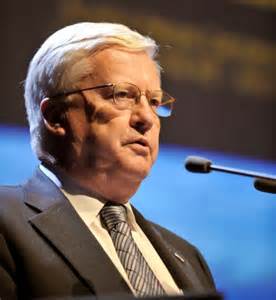Threat of climate change requires urgent action and creative thinking

file
Martin Lees
In 2013, the smog blackened Chinese cities with appalling frequency. Finding solutions for maintaining economic growth without further degrading the environment is a critical issue for national development. At present, Martin Lees, former secretary general of the Club of Rome and founding member of The China Council for International Cooperation on Environment and Development, is involved in dealing with China’s emerging economic and international challenges. Recently, WAN’s Mao Li sat down for an exclusive interview with Martin Lees to discuss China’s environmental protection.
Q: As we know, smog is not a challenge limited to China. The West has also faced hazardous pollution. How did the West tackle this problem? What can China learn from the West’s experience?
A: In the industrialization processes in Europe and the U.S., not just air pollution but pollution of various kinds was considered to be effectively a cost of growth. If you wanted to grow, you had to have pollution—that was the basic idea at the beginning. Just look at what happened in Europe: even in the 1950s and 60s in London, we had terrible smog and people died.
In the 1960s and 70s, the British government and the leadership of London concluded that this situation was totally unacceptable: the costs were too high in terms of human health and damage from the terrible smog. First of all, they did very careful studies to find out exactly what was causing it. They concluded that a very major part of the problem was small coal fires in every apartment and house in London. They realized that they had to engage and motivate people in many other parts of society to make the changes work. Within a few years, the little coal fires had almost disappeared all over London, and the air pollution virtually ceased.
The problem in China is not of course simply related to lots of little coal-fired heating units, although this was a major issue in the past. The pollution is also heavily driven by China’s dependence on coal. This issue has got to be faced. It’s not just the question of local smog in China; it is the question of destabilizing the global climate. I think that air pollution in China can be solved partly by incentives to get people to improve the use of energy at the grassroots level. China also needs to restructure its economy and energy system in order to reduce the causes of these problems. The good news is the current leadership understands this. The decisions of the 3rd Plenum are very clear—that China wishes to shift the path of its development onto a different track.
Q: What role should scholars play in the struggle for environmental protection?
A: The role of research and analysis is extremely important, not just to analyze specific issues but also to understand the big picture. That’s what we desperately need, because we are divided up into specialties, sectors and disciplines, such as economists, ecologists, scientists and politicians—all sorts of different people. And these specialists don’t communicate with each other. This is absolutely the central problem, because this division into sectors and into disciplines is what is blocking intelligent progress on these systemic, connected issues of the modern world. We need a coherent approach to analysis, strategy and action where we understand how things fit together. So the role of intellectuals and think tanks will be critical, if we are to lay solid intellectual foundations for a new approach.
Q: Solving climate change is one of humankind’s greatest challenges. The threat of climate change requires urgent action and creative thinking, but international climate negotiations have moved very slowly. What is the real reason behind the deadlock?
A: I agree that climate change is evidently one of the greatest challenges facing humanity and it is a real and intensifying threat to China’s future development. The risks and threats are escalating fast while we fail to take effective action. I think it is still possible to reach a serious international agreement on this problem, but, after years of inaction, time is now short. The question you ask is important: why are these intergovernmental negotiations not getting any results?
First, the scientific understanding of the issues is extremely clear and supported by about 97% of all scientists competent in the field. Normally, you would expect that the international negotiators would focus on trying to define practical policies to avert the threats of dangerous climate change. But it is not so simple. Powerful forces are very anxious to prevent an agreement.
In addition, there is no effective leadership in the world today to press for concerted international action on truly global problems such as climate change.
I am not suggesting that China should take the leadership on these vital issues although China is very vulnerable to the impacts of climate change. However, in practical terms, in my view, China has the capacity, the knowledge, the practical experience and the resources to tackle this problem.
The Chinese version appeared in Chinese Social Sciences Today, No. 543, Dec. 30, 2013
Translated by Mao Li
Revised by Charles Horne
The Chinese link:
http://www.csstoday.net/xueshuzixun/guoneixinwen/86966.html
